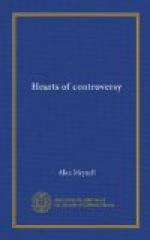Mistress of some of the best prose of her century, Charlotte Bronte was subject to a Lewes, a Chorley, a Miss Martineau: that is, she suffered what in Italian is called soggezione in their presence. When she had met six minor contemporary writers—by-products of literature—at dinner, she had a headache and a sleepless night. She writes to her friend that these contributors to the quarterly press are greatly feared in literary London, and there is in her letter a sense of tremor and exhaustion. And what nights did the heads of the critics undergo after the meeting? Lewes, whose own romances are all condoned, all forgiven by time and oblivion, who gave her lessons, who told her to study Jane Austen? The others, whose reviews doubtless did their proportionate part in still further hunting and harrying the tired English of their day? And before Harriet Martineau she bore herself reverently. Harriet Martineau, albeit a woman of masculine understanding (we may imagine we hear her contemporaries give her the title), could not thread her way safely in and out of two or three negatives, but wrote—about this very Charlotte Bronte: “I did not consider the book a coarse one, though I could not answer for it that there were no traits which, on a second leisurely reading, I might not dislike.” Mrs. Gaskell quotes the passage with no consciousness of anything amiss.
As for Lewes’s vanished lesson upon the methods of Jane Austen, it served one only sufficient purpose. Itself is not quoted by anyone alive, but Charlotte Bronte’s rejoinder adds one to our little treasury of her incomparable pages. If they were twenty, they are twenty-one by the addition of this, written in a long-neglected letter and saved for us by Mr. Shorter’s research, for I believe his is the only record: “What sees keenly, speaks aptly, moves flexibly, it suits her to study; but what throbs fast and full, though hidden, what blood rushes through, what is the unseen seat of life and the sentient target of death—that Miss Austen ignores.”
When the author of Jane Eyre faltered before six authors, more or less, at dinner in London, was it the writer of her second-class English who was shy? or was it the author of the passages here to follow?—and therefore one for whom the national tongue was much the better? There can be little doubt. The Charlotte Bronte who used the English of a world long corrupted by “one good custom”—the good custom of Gibbon’s Latinity grown fatally popular—could at any time hold up her head amongst her reviewers; for her there was no sensitive interior solitude in that society. She who cowered was the Charlotte who made Rochester recall “the simple yet sagacious grace” of Jane’s first smile; she who wrote: “I looked at my love; it shivered in my heart like a suffering child in a cold cradle”; who wrote: “To see what a heavy lid day slowly lifted, what a wan glance she flung upon the hills, you would have thought the




